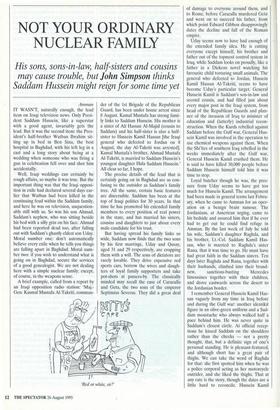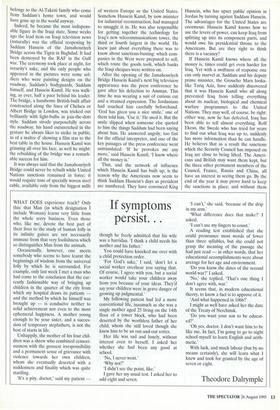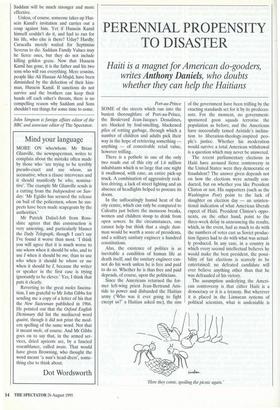NOT YOUR ORDINARY NUCLEAR FAMILY
His sons, sons-in-law, half-sisters and cousins may cause trouble, but John Simpson thinks Saddam Hussein might reign for some time yet
Amman IT WASN'T, naturally enough, the lead item on Iraqi television news. Only Presi- dent Saddam Hussein, like a superstar with a good agent, invariably gets the lead. But it was the second item: the Pres- ident's half-brother Watban Ibrahim sit- ting up in bed in Ben Sina, the best hospital in Baghdad, with his left leg in a cast and a long story about being at a wedding when someone who was firing a gun in celebration fell over and shot him accidentally.
Well, Iraqi weddings can certainly be rough affairs, so maybe it was true. But the important thing was that the Iraqi opposi- tion in exile had declared several days ear- lier that Watban had been killed in the continuing feud within the Saddam family, and here he was on television, unquestion- ably still with us. So was his son Ahmad, Saddam's nephew, who was sitting beside his bed with a silly grin on his face. Ahmad had been reported dead too, after falling out with Saddam's ghastly eldest son Uday. Moral number one: don't automatically believe every exile when he tells you things are falling apart in Baghdad. Moral num- ber two: if you wish to understand what is going on in Baghdad, secure the services of a good genealogist. We are not dealing here with a simple nuclear family; except, of course, in the weapons sense.
A brief example, culled from a report by an Iraqi opposition radio station: 'Maj.- Gen. ICasmal Mustafa Al-Takriti, comman- 'Red or white, sir?' der of the 1st Brigade of the Republican Guard, has been under house arrest since 8 August. Kamal Mustafa has strong fami- ly links to Saddam Hussein. His mother is a sister of Ali Hassan Al-Majid (cousin to Saddam) and his half-sister is also a half- sister to Hussein Kamil Hassan [the Iraqi general who defected to Jordan on 8 August, the day Al-Talcriti was arrested]. Kamal Mustafa's brother, Ahmad Mustafa Al-Takriti, is married to Saddam Hussein's youngest daughter Hala Saddam Hussein.' All clear so far, I hope.
The precise details of the feud that is certainly going on in Baghdad are as con- fusing to the outsider as Saddam's family tree. All the same, certain basic features are discernible. Saddam has been at the top of Iraqi politics for 30 years. In that time he has promoted his extended family members to every position of real power in the state, and has married his sisters, cousins and daughters to just about every male candidate for his trust.
But having spread his family links so wide, Saddam now finds that the two sons by his first marriage, Uday and Qusay, aged 31 and 29 respectively, are cropping them with a will. The sons of dictators are rarely lovable. They drive expensive red sports cars, borrow the wives and daugh- ters of loyal family supporters and take pot-shots at passers-by. The classically minded may recall the case of Caracalla and Geta, the two sons of the emperor Septimius Severus. They did a great deal of damage to everyone around them, and to Rome, before Caracalla murdered Geta and went on to succeed his father, from which point Edward Gibbon disapprovingly dates the decline and fall of the Roman empire.
Uday seems now to have had enough of the extended family idea. He is cutting everyone except himself, his brother and father out of the topmost control system in Iraq, while Saddam looks on proudly, like a father in a Dickens novel watching his favourite child torturing small animals. The general who defected to Jordan, Hussein Kamil Hassan Al-Takriti, seems to have become Uday's particular target. General Hussein Kamil is Saddam's son-in-law and second cousin, and had filled just about every major post in the Iraqi system, from head of the Republican Guards and plan- ner of the invasion of Iraq to minister of education and (latterly) industrial recon- struction. When the Kurds rebelled against Saddam before the Gulf war, General Hus- sein Kamil was involved in the operation to use chemical weapons against them. When the Shi'ites of southern Iraq rebelled in the weeks immediately after the Gulf war, General Hussein Kamil crushed them. He is said to have killed 30,000 people before Saddam Hussein himself told him it was time to stop.
Loyal butcher though he was, the pres- sure from Uday seems to have got too much for Hussein Kamil. The arrangement had been made in general terms last Febru- ary, when he came to Amman for an oper- ation on a benign brain tumour. The Jordanians, at American urging, came to his bedside and assured him that if he ever had to get out he could find refuge in Amman. By the last week of July he told his wife, Saddam's daughter Raghda, and his brother, Lt.-Col. Saddam Kamil Has- san, who is married to Raghda's sister Rana, that it was time to go. He must have had great faith in the Saddam sisters. Ten days later Raghda and Rana, together with their husbands, climbed into their brand- new, sanctions-busting Mercedes limousines together with their children, and drove eastwards across the desert to the Jordanian border.
I remember General Hussein Kamil Has- san vaguely from my time in Iraq before and during the Gulf war: another identikit figure in an olive-green uniform and a Sad- dam moustache who always walked half a pace behind him. He was never quite in Saddam's closest circle. At official recep- tions he kissed Saddam on the shoulders rather than the cheeks — not a pretty thought, that, but a definite sign of one's personal standing. He is pleasant-featured, and although short has a great pair of thighs. We can take the word of Raghda for that: she first spotted him when he was a police corporal acting as her motorcycle outrider, and she liked the thighs. That at any rate is the story, though the dates are a little hard to reconcile. Hussein Kamil belongs to the Al-Tahiti family who come from Saddam's home town, and would have gone up in the world anyway.
Indeed, he became the most indispens- able figure in the Iraqi state. Some weeks ago the lead item on Iraqi television news (naturally) was the official reopening by Saddam Hussein of the Jamahouriyeh Bridge across the Tigris in Baghdad. It had been destroyed by the RAF in the Gulf war. The ceremony took place at night, for security's sake, and the only people who appeared in the pictures were some sol- diers who were painting designs on the roadway, Saddam's bodyguards, Saddam himself, and Hussein Kamil. He was walk- ing, as ever, half a pace behind his leader. The bridge, a handsome British-built affair constructed along the lines of Chelsea or Albert Bridge in London, was tricked out brilliantly with light-bulbs in join-the-dots style. Saddam strode purposefully across the roadway, his hand outstretched in the gesture he always likes to strike in public, as of a maitre d' showing a film star to the best table in the house. Hussein Kamil was grinning all over his face, as well he might: the rebuilding of the bridge was a remark- able success for him.
It was always said that the Jamahouriyeh Bridge could never be rebuilt while United Nations sanctions remained in force; it would require tons of specially woven steel cable, available only from the biggest mills of western Europe or the United States. Somehow Hussein Kamil, by now minister for industrial reconstruction, had managed to smuggle it in. He was also responsible for getting together the technology for Iraq's new telecommunications tower, the third or fourth largest in the world. He knew just about everything there was to know about sanctions-busting: which com- panies in the West were prepared to sell, which route the goods took, which banks the Iraqi cheques were written on.
After the opening of the Jamahouriyeh Bridge Hussein Kamil's next big television appearance was the press conference he gave after his defection to Amman. This time he was wearing a suit of curious cut and a strained expression. The Jordanians had coached him carefully beforehand. 'God has given you a nice smile,' one of them told him. 'Use it.' He used it. But the smile slipped when someone else quoted to him the things Saddam had been saying about him. He answered angrily, too fast for the official interpreter, and one of the key passages of the press conference went untranslated: 'If he provokes me any more,' said Hussein Kamil, 'I know where all the money is.'
That, and the network of influence which Hussein Kamil has built up, is the reason why the Americans now seem to think Saddam Hussein's days as president are numbered. They have convinced King Hussein, who has upset public opinion in Jordan by turning against Saddam Hussein. The advantages for the United States are enormous: Hussein Kamil knows how to use the levers of power, can keep Iraq from splitting up into its component parts, and would owe his presidential throne to the Americans. But are they right to think there is a vacancy?
If Hussein Kamil knows where all the money is, times could get even harder for Iraq. Yet with a swiftness of response one can only marvel at, Saddam and his deputy prime minister, the Groucho Marx looka- like Tariq Aziz, have suddenly discovered that it was Hussein Kamil who all along prevented Iraq from telling everything about its nuclear, biological and chemical warfare programmes to the United Nations. They may well, of course, be right: either way, now he has defected, Iraq has been able to tell almost everything. Rolf Ekeus, the Swede who has tried for years to find out what Iraq was up to, suddenly has more information than he can handle. He believes that as a result the sanctions which the Security Council has imposed on Iraq are close to being lifted. The Ameri- cans and British may want them kept, but the three other permanent members of the Council, France, Russia and China, all have an interest in seeing them go. By the end of the year it may prove hard to keep the sanctions in place; and without them Saddam will be much stronger and more effective.
Unless, of course, someone takes up Hus- sein Kamil's invitation and carries out a coup against him. Yet if Hussein Kamil himself couldn't do it, and had to run for his life, who else is there? Uday? Hardly; Caracalla merely waited for Septimius Severus to die. Saddam Family Values may be fierce ones, but they do not include killing golden geese. Now that Hussein Kamil has gone, it is the father and his two sons who will run everything. Mere cousins, people like Ali Hassan Al-Majid, have been diminished by the defection of their kins- man, Hussein Kamil. If sanctions do not survive and the brothers can keep their hands off each other's throats, there is no compelling reason why Saddam and Sons shouldn't run things for some time to come.
John Simpson is foreign affairs editor of the BBC and associate editor of The Spectator.




















































 Previous page
Previous page